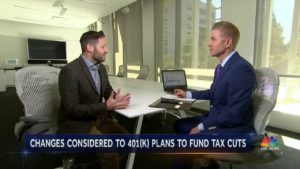
Tax Audit Risk
The only thing people hate more than filing their taxes might just be an IRS Audit. Learning of a large tax bill would probably take third place. In reality, the risk of being audited is quite low. Less than 1% of tax returns are audited each year. Here are four tax moves that will increase your odds of staying out of the unlucky 1%. Follow these 4 helpful tips to reduce your IRS Audit Risk. 2020 was a complicated year with COVID, PPP Loans, and some new tax rules, which can make it easy to make a mistake when filing your taxes that could lead to an audit.
By David Rae Certified Financial Planner™, Accredited Investment Fiduciary™
As a child, I remember my parents seemed to get audited every single year. All of their friends seemed to get audited every single year as well. My father (Mike Rae) was an NFL quarterback, and most of his friends were also playing pro sports. Let’s just say they had big ol’ IRS targets on their backs. High income and lots of moving pieces as far as where they lived and worked. While my view of the IRS was skewed at this time, the fact is that many people will go their entire lives without an audit.
It’s no secret that the average person would prefer to stay off of the IRS audit radar. Here are 4 tips to avoid putting a big ol’ red flag on your tax returns.
-
Spend a little extra time making sure your taxes are filed correctly.
We all know the tax deadline falls somewhere around April 15th each and every year. For 2020, the tax filing deadline is May 17th, 2020 to be exact. No matter what day of the week that is, we all know someone will be turning in their taxes at about 11:59 PM on that day and others who end up filing for extensions. Even with an extension taxes are still due by the deadline, or you will accrue penalties and interest.
When you have a deadline looming you increase your odds of making small mistakes that can open a can of worms and the potential for an IRS Audit. Take a little extra time and make sure you’ve included all of your income, and that you haven’t transposed a digit in your Social Security number. It happens more often than you would think. Also, make sure you are using the right filing status. Your spouse really won’t appreciate it if you are married and mistakenly mark single.
Put prepping your taxes on your calendar. Even if you are using a tax preparer or CPA you still need to provide that person with your tax information in a timely fashion. Set a goal to have everything together a month ahead of the deadline. This will give you some extra breathing room if you have to track down some missing tax forms or end up with a surprisingly large tax bill.
-
Ditch the Paper – File Online
Back in the day, simple addition errors were one of the main red flags for a tax audit. Another was missing pages or even full missing forms. I’m not ready to guarantee that you won’t make a mistake filing online, but let’s be realistic. Who do you think is better at math – you or your computer? Simple mistakes can put you on the audit list. Also, just missing forms and paying the wrong amount in taxes could result in additional IRS penalties and costing you more money.
According to the IRS, about 21% of paper filers have some errors on their returns. That means 1 out of 5 people has a mistake. But for those who choose to file their taxes online, that number drops to less than 1%. Beyond lowering your risk of an audit, I think the process of filing online is much easier. You are also much more likely to realize if you need help with one particular area when filing your taxes.
If you are still on the fence about filing online, consider this. Filing your taxes online means you get to avoid the long lines at the post office on May 17th and you will get your tax refund check earlier.
-
Don’t Make Up Numbers Even if You are Close
The thing I love about math is it’s easy to be exact. The IRS really loves math and accuracy. When you are filing your taxes do the extra work and use cold hard numbers. You can round to the nearest dollar – the IRS doesn’t seem to care about all those extra pennies. But still, make sure the numbers are accurate.
Perhaps you forgot to include that 1099 for $11.03 in interest from your bank or claimed $300 in charitable deductions but had receipts for $295. The IRS may wonder what other errors may be in your return. On the off chance, the IRS does question the deduction – even if you are just off by a few dollars they will likely continue down the list and question other numbers in your tax return.
Just as bad as forgetting to include information is mis-entering it. Using the above-mentioned 1099 form, with $11.03 in interest from your bank, if you mis-enter the amount as $12 instead of entering $11.03, the IRS computer will likely kick it back as not matching up. If it does get kicked back, your audit risk skyrockets.
If you are missing a 1099 tax form, or haven’t received one from an employer contact them to find out how to get a replacement. Every 1099 or tax you receive the IRS gets a copy as well. They will know if you don’t include one.
-
Not Accurately Tracking Your Deductions
Nobody wants to pay more taxes than they absolutely have to. The US tax code provides a ton of tax deductions that can help lower your tax liability if you end up itemizing. If you take the standard deduction you won’t have to track many deductions, if any. On the other hand, you might end up paying more in taxes.
Proceed with caution when calculating your deductions, extraordinary deductions may invite IRS scrutiny. Earlier I mentioned rounding to the dollar, but don’t be careless and use all round numbers like $12,000 for medical expenses. For example, if that number adds up to $12,139.47, then actually say $12,139. Having too round of a number will likely raise suspicion.
If you happen to be claiming unusually large deductions relative to your income make sure you have the paperwork to back it up. Someone battling a life-threatening disease may spend 90-100% of their income on medical bills or more. For an otherwise healthy person, this type of spending might come off as a little dramatic.
Similarly, someone with a $100,000 income who donates $60,000 to charity might also raise some red flags. At the same time, an NFL quarterback donating $60,000 on a $10,000,000 salary really may not be that crazy of a number. If you are entitled to the deduction, take it, but make sure you have the documentation to back it up. The IRS will likely ask for it.
It’s not what you make but what you keep. So why pay any more taxes than you need to. Live for Today, Plan for tomorrow.

DAVID RAE, CFP®, AIF® is a West Hollywood financial planner with DRM Wealth Management. A regular contributor to Forbes.com Advocate Magazine, Huffington Post, Investopedia not to mention numerous TV appearances. He helps friends of the LGBT Community get on track for their financial goals. For more information visit his website at www.davidraefp.com










[…] Kaugnay: & nbsp; & nbsp;Pag-iwas sa Dreaded IRS& nbsp;Audit& nbsp;4 Mahalagang Tip […]
[…] 相关阅读:  避免可怕的IRS 审计 4个关键提示 […]
[…] Liên quan: & nbsp; & nbsp;Tránh IRS đáng sợ& nbsp;Kiểm toán& nbsp;4 mẹo rất quan trọng […]
[…] Súvisiace: & nbsp; & nbsp;Vyhnutie sa obávanému IRS& Nbsp;Audit& Nbsp;4 Dôležité tipy […]
[…] Related: Avoiding the Dreaded IRS Audit 4 Crucial Tips […]
[…] Related: Avoiding the Dreaded IRS Audit 4 Crucial Tips […]
[…] audit risk from the home office deduction is likely an urban myth or at least a bit exaggerated. While the […]